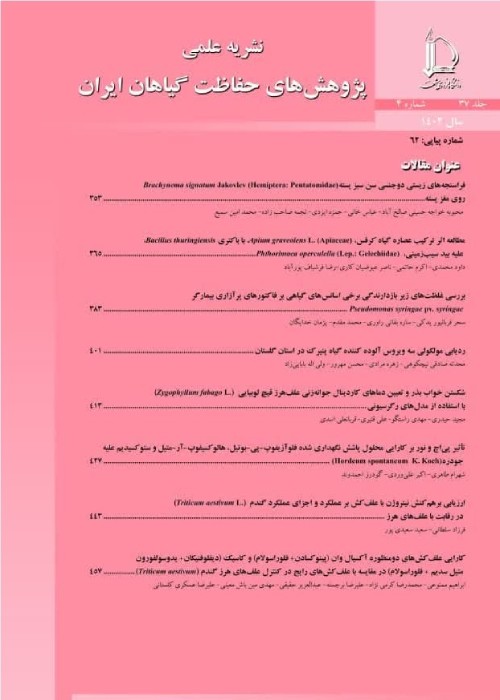The Combined Effect of Plant Extracts and Vermicompost on Some of the Biological Characteristics of Bemisia tabaci (Homoptera: Aleyrodidae)
The sweet potato whitefly, Bemisia tabaci (Gennadius) (Hemiptera: Aleyrodidae), is an economically important pest of a variety of agricultural crops worldwide. The control of sweet potato whitefly largely relies on the use of synthetic insecticides. However, the efficiency of chemical control is questionable with respect to the activity of adults and immatures on the abaxial surfaces of leaves. In addition, under the strong selection pressure of the chemical control, whitefly populations have become resistant to most registered insecticides. Therefore, the search for more environmentally friendly options for whitefly control is necessary. Botanical extracts are broad-spectrum materials, used in pest control and they compared to synthetic ones may be safer for the environment, are, generally, less expensive and are often decomposed to nontoxic products. They are potentially suitable for use in integrated pest management. Recently, in addition to the botanical insecticides, vermicomposting has been also proposed as a safe control method for insect pests. Vermicompost is an organic soil amendment, produced by earthworm digestion of organic waste. Studies show that plants grown in soil amended with vermicompost grow faster, are more productive and are less susceptible to a number of arthropod pests. In this research studied the mortality effect of ethanol extracts of the seeds and leave of Ricinus communis L. (Euphorbiaceae), Sophora alopecuriodes L. (Fabaceae), Aloe vera (L.) (Liliaceae) on adults of B. tabaci that reared on a tomato that planting in vermicompost from two different sources (pistachio waste and cattle manure). This result was compared with the insecticide abamectin.
The experiments were carried out in a completely randomized design and in a growth chamber at 25±2 ºC, photoperiod of 16: 8 (L: D) and with the 55±5 % relative humidity. Seed from the tomato cultivar ‘CH-Falat’ were sown into the pots (5×10 cm), containing different growth media. The three growth mixtures tested were: (i) 100% BAGA (sterile plant growth media); (ii) 70% BAGA with 30% pistachio waste vermicompost; (iii) 70% BAGA with 30% cattle manure vermicompost. After the bushes reached the 2- 4 leaf stage the bioassay tests were done by using the leaf-dip method. After drying of leaves, 20 adults of B. tabaci (24h) were released into each pot. The mixture of ethanol and distilled water (1:10) was as a control. After 72 h, mortality was recorded. To determine the effects of the sub-lethal dose (LC25) on the developmental durations of B. tabaci, the tomato pots that were prepared as above mentioned, dipped into LC25 concentration of each extract and abamectin, for 5s. After the drying of leaves, 15 pairs of B. tabaci adults were released in the pots and the cage was covered on the pot immediately. B. tabaci were removed from the plants after 72 hours and only the eggs less than 24 hours old were kept for the recording of the different stages of B. tabaci.
Based on the results, the kind of growth media was effective in the influence of extracts and abamectin, and the least LC50 of each insecticide was recorded in growth media that was added by pistachio waste vermicompost. Among the extracts, Aloe vera and leave of R. communis extracts showed the best and lowest effect against the B. tabaci with LC 50 value of 0.855 g/l and 22.841 g/l respectively (in pistachio waste vermicompost media). Subletal (LC25) effects of treatments on biological parameters of B. tabaci were significant compared to the control plant (p<0.05). Based on the results, the most mortality (%) in egg (22.84%), nymphal (42.11%) and pupal (11.94%) periods of B. tabaci was recorded for abamectin, Aloe vera and S. alopecuriodes extracts respectively. The interaction between vermicompost and extract was significant, and the longest of the nymphal period (19.83±0.67 days) was recorded on whiteflies that were treated by R. communis and reared on tomato plants grown in pistachio waste vermicompost. The shortest of this period (11.14±0.34 days) was recorded on control plant that grown in BAGA. Taken together, the longest development time was recorded on whiteflies that treated by S. alopecuriodes and reared on tomato plants grown in pistachio waste vermicompost and the shortest of this period was on insects treated by Aloe vera extract and pistachio waste vermicompost media. Plants fertilized with pistachio waste vermicompost had significantly higher phenolic content (10 mg/mL) than control (BAGA) (6.08 mg/mL), while those in cattle manure vermicompost group exhibited intermediary value (7.28 mg/mL).
These results indicated that the concomitant use of extract and vermicompost was more effective for controlling of B. tabaci. The most mortality caused by Aloe vera extract and amending of pistachio waste vermicompost into growth media increased its effectiveness. So, these extract and vermicompost can play an important role in the managing of B. tabaci in greenhouse crops.
- حق عضویت دریافتی صرف حمایت از نشریات عضو و نگهداری، تکمیل و توسعه مگیران میشود.
- پرداخت حق اشتراک و دانلود مقالات اجازه بازنشر آن در سایر رسانههای چاپی و دیجیتال را به کاربر نمیدهد.



